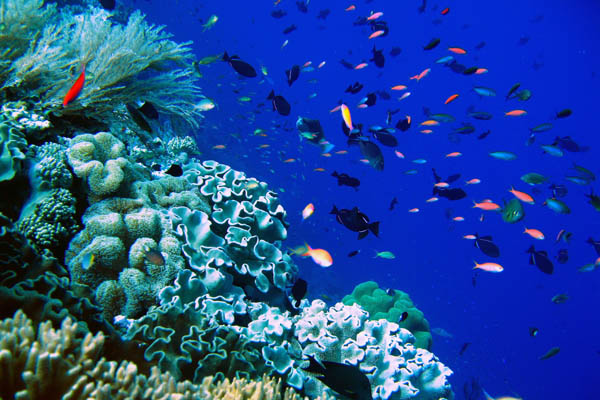
Photo courtesy of TNC Indonesia
Fisherman still using bombs to catch fish in Indonesia
Although prohibited, some fishermen in Indonesia are still using fish bombs to catch fish. In fact, now they are becoming more sophisticated in their use, according to Coastal Community Development Director and Business Development Ministry of Maritime Affairs and Fisheries Ansori Zawawi. The practice is associated with damage to coral reefs and pollution. Blast fishing is also dangerous — last week a Lembata fisherman, Abdul Rahman was killed after a bomb detonated accidentally. Blast fishing made international headlines earlier this year when authorities revealed an area of Komodo Island’s renowned marine park had been severely damaged by illegal fishermen.
Indonesia launches international year of the rhino
Indonesian government is going to launch International Rhino Year on June 5th, World Natural Environtment Day. The International Union for Conservation of Nature (IUCN) choose Indonesia for the declaration because Indonesia has two criticially endangered rhinos species, the Javan rhino (Rhinoceros sondaicus) and Sumatra Rhino (Dicerorhinus sumatrensis). There are five surviving rhinos species worldwide.
Scientist find blind fish, crab and shrimp in Sulawesi cave
A biologist at the Indonesian Institute of Sciences (LIPI) found several new blind animals (fish, crab and shrimp) in Maros Karst, South Sulawesi. According to LIPI researcher Yayuk R Suhardjono the blind fish is about 10 cm long, while the crab is only one cm.
Indonesian president launches energy saving policy
Indonesian President Susilo Bambang Yudhoyono launched five energy efficiency policies on June 1 in an effort to reduce energy consumption.
Review of forestry licenses is necessary to improve forest management
A review of forestry permits is an effective way to make forest management better, said an official with the REDD+ Task Force.
Anti-mining protest in Indonesia
Activist groups demanded Aburizal Bakrie be held accountable for the Lapindo mud volcano on the sixth anniversary of the disaster. Civil society groups said mining has come at a great cost to Indonesia’s environment and local residents.
Two people were shot in an anti-mining demonstration in Sulawesi
Two protesters were shot during an anti-mining demonstration in North Sulawesi. The demonstrators were protesting a gold mining operation.
Tigress trapped in a steel sling
A female Sumatran tiger was reported trapped in a deer trap in the village of Muara Hemat in Kerinci regency, Jambi. The 1.5-meter-long tiger was entangled in a steel sling in the middle of a dense bush, making it difficult to free her. The tigress was severely injured and lost her two right toes. She was taken to Taman Rimba zoo in Jambi. It’s unknown whether she will be released back into the wild, given her injuries.
Weak law enforcement in Kalimantan cost Indonesia $34b, claim activists
Illegal forest clearing in Kalimantan potentially cost the state Rp 321 trillion ($34.6 billion) in losses last year, largely because law enforcement efforts on the ground remain weak, activists claimed on Wednesday. Citing data from the Forestry Ministry, Indonesia Corruption Watch and the environmental group Save Our Borneo, the activists said in a joint statement that the province of Central Kalimantan accounted for nearly half the losses because of the large number of firms there operating with ‘flawed permits.’ The groups said some 282 plantation firms and 629 mining firms were responsible for the deforestation of at least seven million hectares in the province. The groups identified similar potential losses of Rp 121.4 trillion in West Kalimantan, Rp 31.5 trillion in East Kalimantan and Rp 9.6 trillion in South Kalimantan.
Victims of Lapindo mud volcano stage ceremony to end back luck after disaster
In commemoration of six years since the Lapindo mud tragedy, a group of children staged a ruwatan ceremony to rid their community of bad luck and demand action by parties responsible for the disaster.
Bali suffering coastal erosion
Denpasar, Gianyar, Karangasem and Jembrana suffered acute coastal erosion during 2010, reported the Bali Environment Office. Of the Bali’s 437 kilometers of coastline, 102 kilometers were damaged by erosion. 48 beaches in Bali are now experiencing acute erosion, which is mainly caused by neglect of coastal zoning laws.
Endangered Dugongs in Balikpapapan Gulf Face Extinctions
The endangered dugong (Dugong dugon), or seacow, is at risk of extinction in Balikpapan Gulf, East Kalimantan due to industrial expansion, says a researcher. In Kalimantan, dugong can be found in five locations: Balikpapan Gulf; Berau regency, East Kalimantan; Derawan island; Karimata island, West Kalimantan; Kotawaringin, South Kalimantan; and Kumai Gulf in Central Kalimantan.
Freeport-McMoran to seek gold and copper in Borneo
After 40 years of mining in Papua, Freeport-McMoran Copper and Gold will launch operations in Kalimantan. Freeport-McMoran is partnering with the Kalimantan Gold Corporation to exploit copper and gold in Kalimantan. Freeport-McMoRan has been criticized for environmental damage and social conflict in Papua, the Indonesian half of New Guinea.
Related articles